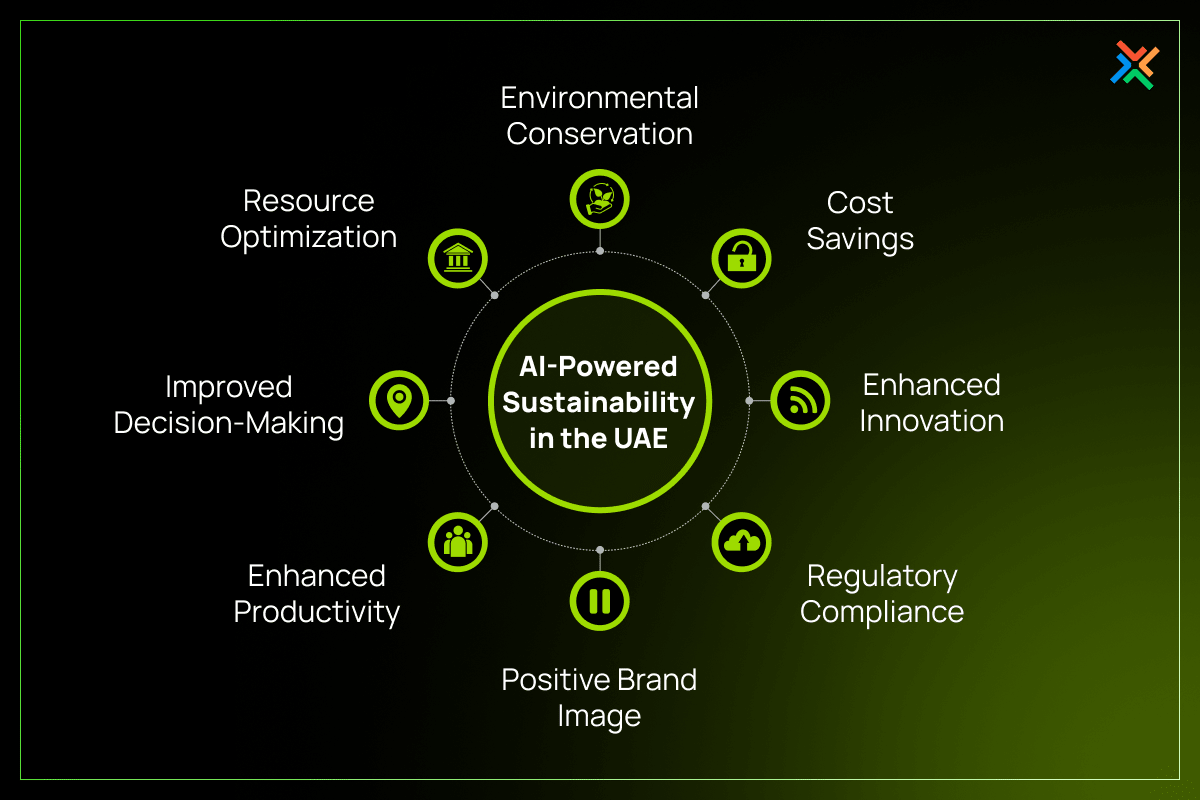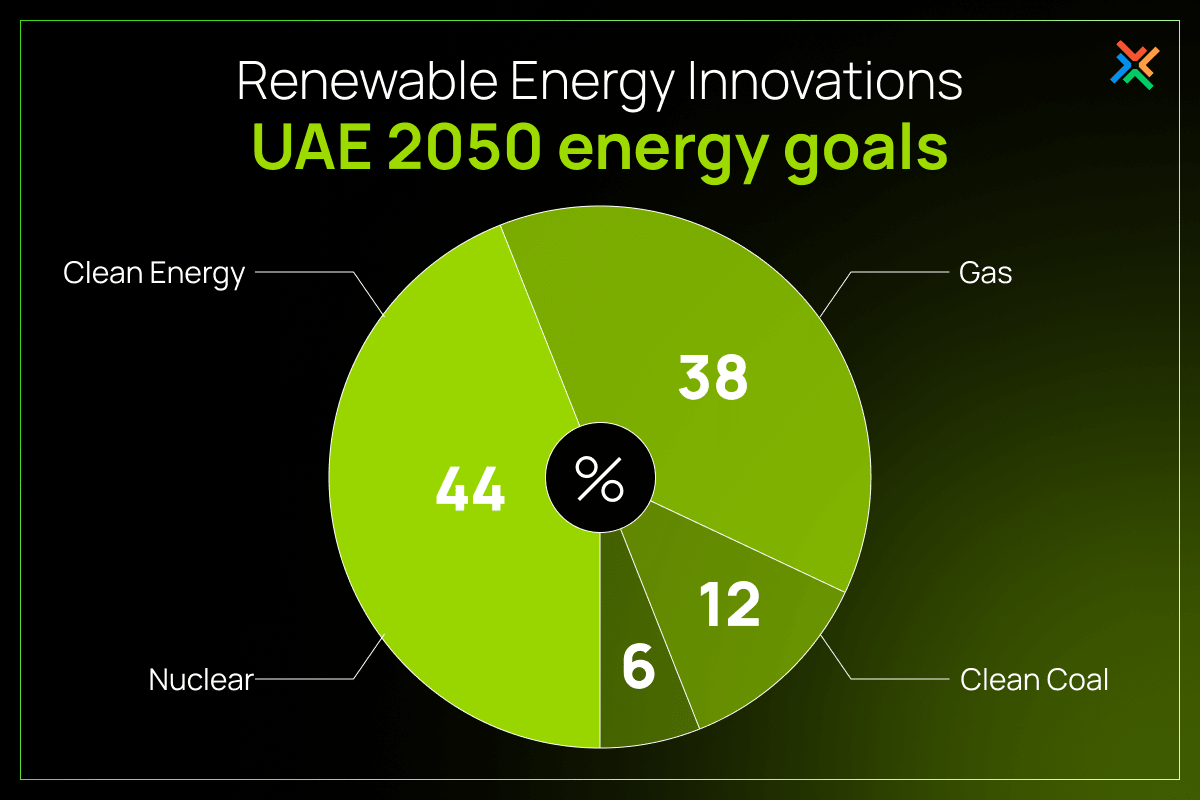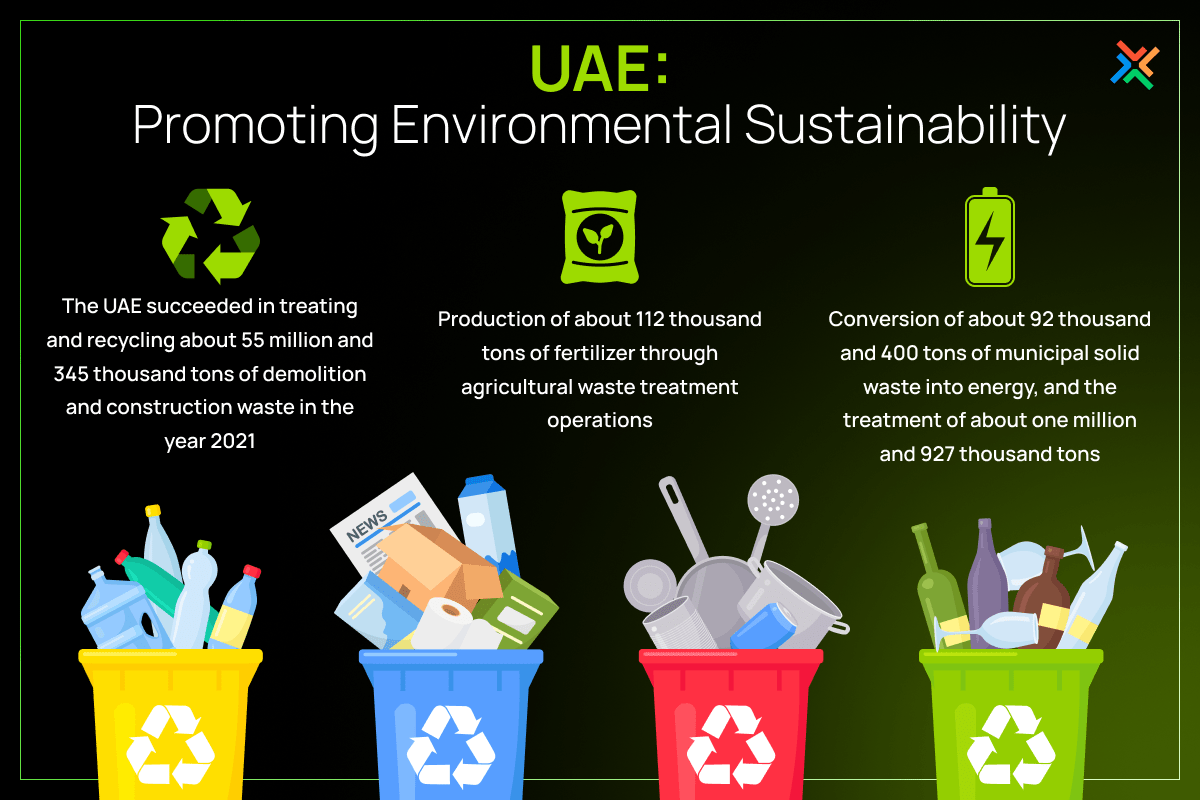Sustainable Tech Innovations: How the UAE is Pioneering Green Technologies
July 22, 2024

Vivek Adatia

The United Arab Emirates (UAE), a nation long synonymous with vast oil reserves and futuristic skylines, is transitioning toward a global leader in sustainable technology innovations. Driven by a steadfast commitment to combating climate change, the UAE has set ambitious goals, including a target to achieve net-zero carbon emissions by 2050.
Green technology is playing a pivotal role in this mission, as the UAE resorts to innovation to address pressing environmental challenges. From pioneering renewable energy projects to advancements in waste management, water conservation, and sustainable urban development, the UAE is redefining what is possible when it comes to sustainability.
By utilizing cutting-edge technologies, such as AI development services in the UAE, the nation is not only reducing its carbon footprint but also moving toward becoming a prosperous, eco-friendly, economy that can serve as a model for the region and the world.
The UAE's Green Tech Ambitions
The UAE’s mission of becoming a global leader in sustainable technology is driven by clear and ambitious national strategies. The UAE Vision 2021 and the UAE Green Agenda 2030 serve as the foundation for the country's sustainability efforts, outlining specific goals and targets to transform the UAE into a green economy.
Backing up these ambitions with concrete action, the UAE has allocated a staggering $163 billion towards clean and renewable energy projects, This demonstrates the nation’s strong dedication to a sustainable future. This investment is not only aimed at reducing the country's carbon footprint but also at promoting innovation and creating a thriving green tech ecosystem.
The UAE's commitment to sustainability has earned it global recognition and the opportunity to host prestigious events like the COP28 United Nations Climate Change Conference in 2023. As the host nation, the UAE showcased its sustainable achievements and shared its experiences in driving green technology innovation with the international community. This platform further solidified the UAE's position as a hub for clean tech and a catalyst for global climate action.
AI-Powered Sustainability in the UAE

The UAE recognizes that artificial intelligence (AI) is a powerful tool not just for economic growth but also for environmental progress. By integrating AI solutions into various sectors, the UAE is driving innovation toward a more sustainable future. This vision is clearly reflected in the UAE Strategy for Artificial Intelligence 2031, which outlines a roadmap for utilizing AI to achieve environmental sustainability goals.
The applications of AI in the UAE's green agenda are diverse and impactful. When it comes to green energy, AI development service providers in the UAE are playing a vital role in optimizing production and efficiency. The Dubai Electricity and Water Authority (DEWA) has introduced Digital DEWA, its digital division, to transform into the world's first digital utility equipped with autonomous renewable energy storage systems. DEWA is also implementing groundbreaking projects, such as establishing a 250 MW pumped-storage hydroelectric power plant in Hatta, a pioneering initiative in the Arabian Gulf region.
AI is redefining waste management in the UAE, with the deployment of smart waste bins equipped with sensors and AI algorithms to optimize collection and recycling efforts. The Waste-to-Energy project in Dubai, the world's largest and most efficient facility of its kind, is another example of how AI is driving sustainability in waste management.
In the agricultural sector, AI-powered systems analyze environmental data, including soil conditions, weather patterns, and crop characteristics, to optimize irrigation, enhance pest management, and improve crop yields. The Emirates Institution for Advanced Science and Technology (EIAST) has developed an AI-based agricultural monitoring system that utilizes satellite imagery and AI algorithms to assess crop health, detect pest infestations, and optimize water and fertilizer usage.
AI is also transforming urban planning and development in the UAE. By harnessing AI algorithms, machine learning, Natural Language Processing (NLP), and Computer Vision, AI developers in the UAE are optimizing operations, reducing resource consumption, and improving efficiency in iconic developments across Dubai. Projects like Emaar and Nakheel's Palm Islands exemplify the use of AI-driven data analysis to improve accessibility, safety, and preserve natural ecosystems.
The UAE's commitment to AI-powered sustainability is further evident in its launch of the "Trade-Sustain-AI" initiative, which seeks to tap into the fast-advancing potential of artificial intelligence in supply chains to boost the efficiency, resilience, and sustainability of global trade. This initiative underscores the UAE's vision to harness AI for a more sustainable future.
Renewable Energy Innovations

The UAE’s green tech ambitions are driven by a focus on tapping into renewable energy sources. The nation boasts some of the world’s most impressive solar power projects, with the Mohammad bin Rashid Al Maktoum Solar Park standing as a prime example. This record-breaking park has a capacity of over 5000 megawatts, generating clean energy for millions of homes and considerably reducing the UAE’s reliance on fossil fuels.
Furthermore, wind power is also gaining traction with the recent launch of the country’s first wind power program showcasing a commitment to diversifying the renewable energy mix. These large-scale projects are critical for achieving the UAE’s clean energy goals.
Apart from established renewables, the UAE is actively exploring alternative energy sources. Hydrogen, a clean-burning fuel produced through electrolysis using renewable energy, is a primary focus. The Green Hydrogen Project, a national initiative, aims to establish the UAE as a leader in green hydrogen production. This clean fuel can be used in various sectors, including transportation and power generation, offering a promising path toward a sustainable future.
Waste Management Advancements
Alongside partnering with leading AI development companies in the UAE for waste collection and management, the nation is adopting another innovative approach in the form of organic waste composting. Turning food scraps and yard waste into nutrient-rich compost reduces landfill burden and provides a valuable soil amendment. Community composting programs and in-home composting solutions are becoming increasingly popular, promoting a more circular approach to waste management.
The UAE is also exploring advanced recycling technologies. These innovative methods aim to break down even complex materials like plastics and e-waste into their base components, allowing them to be reused in new products. This reduces reliance on virgin resources as well as keeps valuable materials out of landfills.
Looking ahead, the UAE is investigating even more futuristic solutions. Plasma gasification, a technology that utilizes high temperatures to convert waste into usable syngas (synthetic gas), shows strong promise. These syngas can then be used for power generation or fuel production, further closing the loop on waste management.
Sustainable Agriculture Initiatives

The Abu Dhabi Environment Agency (EAD) is leading the charge in sustainable agriculture through its innovative soil monitoring initiative that leverages remote sensing technologies. By utilizing drones equipped with advanced sensors, EAD is able to survey vast areas of land, collecting data on soil composition, moisture levels, and potential contaminants. This data is then analyzed using artificial intelligence and machine learning algorithms to provide a comprehensive understanding of soil health across the emirate.
One of the most impressive examples of sustainable agriculture in the UAE is the Bustanica farm in Dubai, which is the world's largest hydroponic agriculture-based vertical farm. Spanning an impressive 330,000 square feet, Bustanica is capable of producing up to 3,000 tons of leafy greens and herbs annually. By utilizing vertical farming techniques and hydroponic systems, the farm is able to reduce water consumption by up to 95% compared to traditional farming methods.
Bustanica's state-of-the-art facility is designed with sustainability in mind, incorporating energy-efficient technologies and renewable energy sources to minimize its environmental impact. The farm's innovative approach to agriculture is helping to reduce the UAE's reliance on imported produce as well as setting a new standard for sustainable food production in the region.
Sustainable Architecture
The United Arab Emirates has placed a strong emphasis on eco-friendly building design principles that prioritize energy efficiency, water conservation, and occupant well-being. This commitment to sustainable architecture is evident across the country, with numerous innovative firms leading the charge.
One such firm is First Trend Architects, a leading engineering company that specializes in providing comprehensive solutions for sustainable design. They create iconic, energy-efficient structures that integrate traditional architectural elements with advanced technologies.
The firm's approach to sustainable architecture focuses on minimizing the environmental impact of buildings throughout their entire life cycle. This involves the conscientious use of materials, energy, and space, as well as the implementation of strategies to optimize resource efficiency and occupant comfort.
The UAE's commitment to sustainable architecture is further exemplified by the Sheikh Zayed Desert Learning Centre at Al Ain Zoo. This model of environmentally friendly design utilizes recycled materials for 80% of its construction and incorporates solar panels to provide more than half of the building's power.
Across the UAE, developers and architects are working together to push the boundaries of sustainable design, incorporating passive solar approaches, net-zero energy consumption, and smart climate strategies. This collaborative effort is transforming the built environment and setting new standards for eco-friendly construction in the region.
Cleantech Startups and Innovations
The United Arab Emirates has witnessed a surge of innovative cleantech startups that are driving sustainability and aligning with the country's ambitious Energy Strategy 2050. These startups are pioneering solutions across a range of sectors.
Prominent examples include Solavio, a Dubai-based company developing next-generation solar concentrators, and BANTgo, which has created a mobile app to engage employees on sustainability initiatives. QANATU, a UAE-based startup, is tackling waste management through its AI-powered smart waste bins, while Nadeera is utilizing blockchain technology to provide traceability and transparency for carbon offsetting.
The UAE's commitment to cleantech innovation is further exemplified by its investments in hydrogen technology. The country has adopted a national strategy for hydrogen, aiming to consolidate its position as a producer and exporter of low-emission hydrogen over the next eight years, aligning with its broader goal of becoming a global leader in low-carbon hydrogen production.
Challenges and Future Prospects
While the United Arab Emirates has made remarkable strides in sustainable technology innovations, the journey towards a greener future is not without its challenges. Implementing these cutting-edge solutions at scale requires overcoming various obstacles, including the need for further research, development, and localization of climate technologies.
One of the key challenges lies in adapting global technologies to the unique environmental and climatic conditions of the UAE. Many sustainable solutions are designed for different geographical regions, and their smooth integration into the local context requires extensive testing, optimization, and customization.
Nurturing collaborative efforts between international partners and local researchers and engineers is crucial to address this challenge and facilitate the successful deployment of these technologies.
Additionally, the widespread adoption of sustainable innovations often depends on addressing the specific needs and concerns of end-users. Engaging with communities, understanding their pain points, and designing user-centric solutions are essential for driving widespread acceptance and utilization of these technologies. Addressing affordability, accessibility, and ease of use are also crucial factors for the long-term success of sustainable tech initiatives.
The UAE recognizes the importance of technology transfer and knowledge-sharing on a global scale. Collaborating with international partners, sharing best practices, and supporting the development of sustainable technologies in other regions can amplify the impact of the UAE’s efforts and contribute to the global fight against climate change.
A Sustainable Future Powered by Innovation
The UAE's journey towards a sustainable future serves as a powerful inspiration for other nations. By adopting innovation, investing in clean technologies, and promoting a collaborative environment, the UAE is demonstrating that a greener tomorrow is achievable.
The nation’s success story offers valuable lessons and exhibits how impactful technological advancements can be in tackling climate change.
The UAE's commitment to a sustainable future is a call to action for all of us. At WDCS, technology plays a crucial role in creating a cleaner tomorrow. As a responsible AI development company in the UAE, we are actively exploring innovative solutions and implementing sustainable practices within our own operations. Connect us today to hire the best AI engineers in the UAE or discuss the technological front of your next green project.
Supercharge your eco-friendly project with sustainable tech solutions from WDCS
Building an eco-project? WDCS can be your ideal tech partner. We can simplify your green tech integration by providing innovative solutions that promote sustainability, reduce impact, and maximize results.